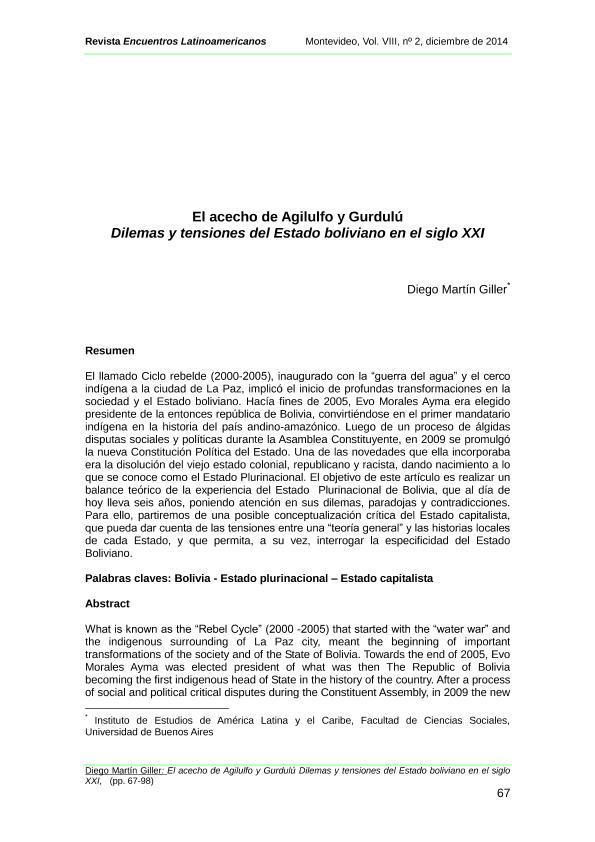Artículo
El llamado Ciclo rebelde (2000-2005), inaugurado con la “guerra del agua” y el cerco indígena a la ciudad de La Paz, implicó el inicio de profundas transformaciones en la sociedad y el Estado boliviano. Hacía fines de 2005, Evo Morales Ayma era elegido presidente de la entonces república de Bolivia, convirtiéndose en el primer mandatario indígena en la historia del país andino-amazónico. Luego de un proceso de álgidas disputas sociales y políticas durante la Asamblea Constituyente, en 2009 se promulgó la nueva Constitución Política del Estado. Una de las novedades que ella incorporaba era la disolución del viejo estado colonial, republicano y racista, dando nacimiento a lo que se conoce como el Estado Plurinacional. El objetivo de este artículo es realizar un balance teórico de la experiencia del Estado Plurinacional de Bolivia, que al día de hoy lleva seis años, poniendo atención en sus dilemas, paradojas y contradicciones. Para ello, partiremos de una posible conceptualización crítica del Estado capitalista, que pueda dar cuenta de las tensiones entre una “teoría general” y las historias locales de cada Estado, y que permita, a su vez, interrogar la especificidad del Estado Boliviano. What is known as the “Rebel Cycle” (2000 -2005) that started with the “water war” and the indigenous surrounding of La Paz city, meant the beginning of important transformations of the society and of the State of Bolivia. Towards the end of 2005, Evo Morales Ayma was elected president of what was then The Republic of Bolivia becoming the first indigenous head of State in the history of the country. After a process of social and political critical disputes during the Constituent Assembly, in 2009 the new Political Constitution of the State was promulgated. One of the novelties that were incorporated was the dissolution of the old colonial republic and racist state, gave rise to what is known as the Plurinational State. The aim of this article is to make a theoretical evaluation of the experience of the Plurinational State of Bolivia that, along the past six years, has been focusing on its dilemmas, paradoxes, and contradictions. For that purpose, the starting point will be one possible critical conceptualisation of the capitalist State that can tell the tensions between “general theory” and the local histories of each State and that, at the same time, can question the specificity of the Bolivian State.
El acecho de Agilulfo y Gurdulú: Dilemas y tensiones del Estado boliviano en el siglo XXI
Fecha de publicación:
07/2014
Editorial:
Encuentros Latinoamericanos
Revista:
Encuentros Latinoamericanos
ISSN:
1688-437X
Idioma:
Español
Tipo de recurso:
Artículo publicado
Clasificación temática:
Resumen
Palabras clave:
Bolivia
,
Estado Plurinacional
,
Estado Capitalista
Archivos asociados
Licencia
Identificadores
Colecciones
Articulos(SEDE CENTRAL)
Articulos de SEDE CENTRAL
Articulos de SEDE CENTRAL
Citación
Giller, Diego Martin; El acecho de Agilulfo y Gurdulú: Dilemas y tensiones del Estado boliviano en el siglo XXI; Encuentros Latinoamericanos; Encuentros Latinoamericanos; VIII; 2; 7-2014; 1-42
Compartir




